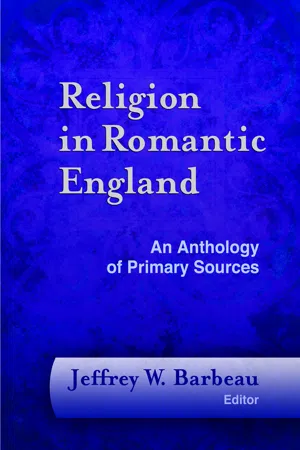
- 507 pages
- English
- PDF
- Available on iOS & Android
About this book
Religion in Romantic England explores the ways that the literature of English Christianity shaped the social, cultural, political, and religious life of the nation in texts published between 1760 and 1832.
From the accession of George III and the expansion of Methodism in the late eighteenth century to the Reform Bill and the beginning of the Oxford Movement of the early nineteenth, this anthology reveals how theological ideas and ecclesial movements influenced one of the most widely studied periods in English literature and history. These tumultuous decades brought religious revival in evangelical preaching and spirituality, controversial responses to the French Revolution, the abolition of the slave trade, the struggle over Roman Catholic emancipation, the proliferation of missionary societies, and intellectual battles over the nature of God, the Bible, faith, church authority, and religious pluralism.
Religious writers in the Romantic period range from poets and preachers to pamphleteers and theologians. In ten thematic chapters tracing pivotal developments in belief and practice, Religion in Romantic England guides readers in understanding the major historical and theological issues that contributed to the literary, educational, and political movements of the era. These judicious selections, drawn from a diverse body of luminaries--including William Carey, Edmund Burke, Mary Wollstonecraft, Joseph Priestley, Hannah More, Percy Shelley, and William Wilberforce, among many others--introduce newcomers and established readers alike to the ideas, controversies, and hopes that continue to affect our common life to this day.
Frequently asked questions
- Essential is ideal for learners and professionals who enjoy exploring a wide range of subjects. Access the Essential Library with 800,000+ trusted titles and best-sellers across business, personal growth, and the humanities. Includes unlimited reading time and Standard Read Aloud voice.
- Complete: Perfect for advanced learners and researchers needing full, unrestricted access. Unlock 1.4M+ books across hundreds of subjects, including academic and specialized titles. The Complete Plan also includes advanced features like Premium Read Aloud and Research Assistant.
Please note we cannot support devices running on iOS 13 and Android 7 or earlier. Learn more about using the app.
Information
Table of contents
- Cover
- Endorsements, Series Page, Title Page, Copyright, Dedication
- Contents
- Acknowledgments
- Introduction
- Historical Timeline
- Abbreviations for Works Commonly Cited
- Part 1. Divinity
- William Jones (1726-1800): Trinity in Unity
- Joseph Priestley (1733-1804): One God
- William Hazlitt (1737-1820): Mission of Jesus
- Thomas Scott (1747-1821): Faith in Christ
- Samuel Horsley (1733-1806): Antiquity
- Percy Bysshe Shelley (1792-1822): Atheism
- Renn Dickson Hampden (1793-1868): Mystery
- Part 2. Faith
- George Whitefield (1714-1770): Repentance
- Augustus Toplady (1740-1778): Predestination
- John Fletcher (1729-1785): Free Grace
- Joseph Milner (1744-1797): Salvation in Christ
- Southwood Smith (1788-1861): Divine Government
- Edward Copleston (1776-1849): Fatalism
- Julius Charles Hare (1795-1855): Light and Darkness
- Part 3. Canon
- Sarah Trimmer (1741-1810): Two Books
- Herbert Marsh (1757-1839): Prayer Books
- Isaac Milner (1750-1820): Bible Societies
- Peter Gandolphy (1779-1821): Rule of Faith
- Edward Hawkins (1789-1882): Scripture and Tradition
- Mary Anne Schimmelpenninck (1778-1856): Spiritual Interpretation
- Edward Irving (1792-1834): Living Word
- Connop Thirlwall (1797-1875): Biblical Inspiration
- Part 4. Doubt
- George Horne (1730-1792): Miracles
- William Wilberforce (1759-1833): Unbelief
- Robert Hall (1764-1831): Infidelity
- William Paley (1743-1805): Evil
- Richard Whately (1787-1863): Miracles and Testimony
- Jeremy Bentham (1748-1832): Pain and the Afterlife
- Hugh James Rose (1795-1838): Faith and Reason
- Part 5. Enthusiasm
- William Law (1686-1761): Spiritual Life
- William Warburton (1698-1779): Divine Grace
- William Romaine (1714-1795): Spirit and Conscience
- John Foster (1770-1843): Evangelical Intellect
- Leigh Hunt (1784-1859): Dangers of Methodism
- Hannah More (1745-1833): Heart Religion
- Joanna Southcott (1750-1814): Prophecies
- Joseph John Gurney (1788-1847): Pure Christianity
- Part 6. Psalms
- Charles Wesley (1707-1788): Family Hymns
- John Newton (1725-1807) and William Cowper (1731-1800): Light Revealed
- William Wordsworth (1770-1850): English Church
- James Montgomery (1771-1854): Christian Hymnody
- John Keble (1792-1866): Nature's Praise
- Felicia Hemans (1793-1835): Divine Mysteries
- Part 7. Morals
- Henry Venn (1725-1797): Marriage
- Soame Jenyns (1704-1787): Christian Virtue
- Thomas Clarkson (1760-1846): Slavery
- John Wesley (1703-1791): Holy Living
- Mary Wollstonecraft (1759-1797): Creation
- Adam Clarke (1762-1832): Tobacco
- Robert Malthus (1766-1834): Chastity
- Part 8. Nation
- Samuel Palmer (1741-1813): English Dissent
- William Stevens (1732-1807): Spiritual Authority
- George Dyer (1755-1841): Religious Subscription
- Edmund Burke (1729/30-1797): Established Church
- Thomas Paine (1737-1809): Toleration
- Anna Letitia Barbauld (1743-1825): National Repentance
- Samuel Taylor Coleridge (1772-1834): The Christian Church
- Part 9. Papacy
- Charles Butler (1750-1832): Catholic Relief
- John Milner (1752–1826): Papal Authority
- Joseph Blanco White (1775–1841): Catholic Tyranny
- William Poynter (1762–1827): Christian Obedience
- Thomas Hartwell Horne (1780–1862): Rome
- Thomas Arnold (1795–1842): Irish Catholicism
- Part 10. Outsiders
- Joseph White (ca. 1746–1814): Christianity and Islam
- William Knox (1732–1810): Native Americans
- William Carey (1761–1834): Missionary Call
- Thomas Coke (1747–1814): Methodism in Africa
- William Carus Wilson (1791–1859): Heathen Cruelty
- Reginald Heber (1783–1826): Missions in India
- Francis Henry Goldsmid (1808–1878): Jewish Emancipation